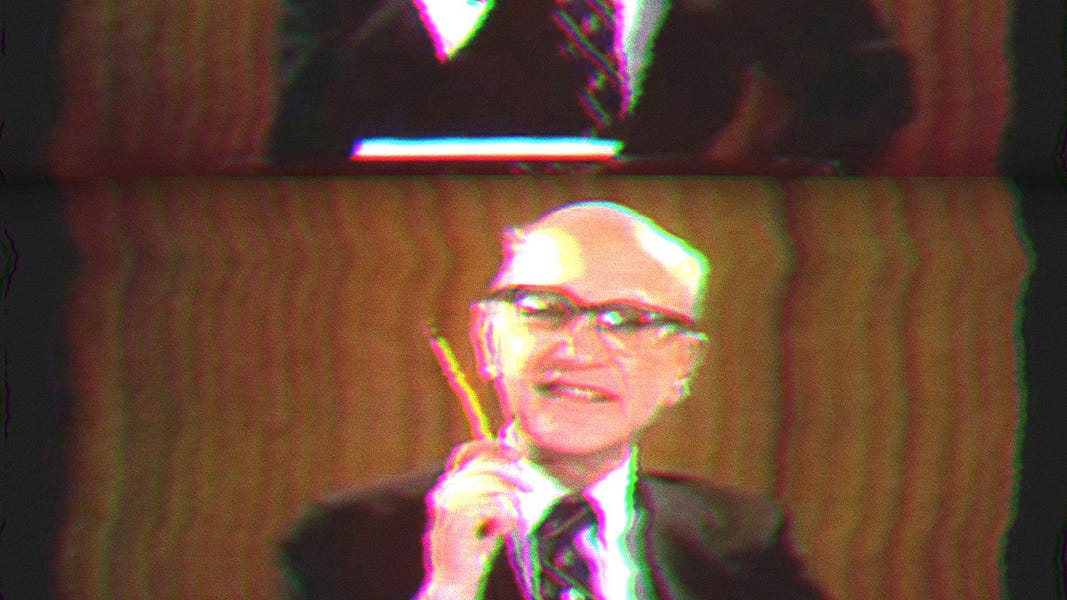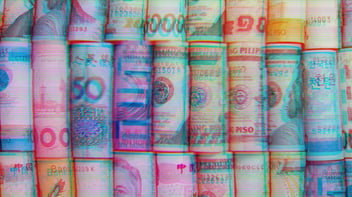Chicago School Teaser.
 Image Description: Milton Friedman holding a pencil.
Image Description: Milton Friedman holding a pencil.
At some point next week, we’ll be releasing our magnum opus on Uncle Milton and The Chicago school of economics. I’m hedging on the date just slightly because we’re taking our time and even getting a few of our friends involved to assist us. It’s important to convey our disdain for Friedman in an erudite manner, because he’s truly a seminal figure in American history. As much as we revel in fucking with the guy, his influence on the field of economics is not to be understated. And it wasn’t all bad. Just mostly bad.
So with that, we bring you the teaser to the Milton Friedman essay. This is just a quick hit to set the table for what’s to come, and recall prior essays that have served as building blocks of knowledge and information. I’m amazed at how engaged everyone has been on social media, here, and in direct emails. It’s clear that we are cultivating an audience of thoughtful (and very funny) pod enthusiasts that are as hungry to learn as we are. Keep on Unf*cking.
Who was Milton Friedman?
What does he represent that makes him the darling of neoliberals, libertarians and conservatives?
And what is his legacy today?
This is the Milton Friedman that we’ve been chasing and the questions we will endeavor to answer in our Fuck Milton Friedman essay next week. The Nobel Prize winning economist lauded for dedication to Price Theory and Monetarism; the man more associated with the University of Chicago than John D. Rockefeller, who bankrolled it. A man whose confidence overshadowed his petite physical form and made him a giant among contemporaries.
A master polemicist, a shrewd politician in his own right and the destroyer of Keynesian philosophy. Milton Friedman was indeed larger than life, and the only thing bigger than his ego is the impact he had on the field of economics.
Friedman did for economists what Steve Jobs did for computer geeks. Before Friedman, economists were cast aside as purveyors of the “dismal science.” They were second class citizens in academia and in Washington with one and only one exception: John Maynard Keynes.
Keynes was the towering figure of the discipline who would spend time at the top and bottom of the mountain of public opinion, but prior to Friedman, he was the field of economics.
But if Keynes was Babe Ruth, then Friedman was Joe DiMaggio. He took over the game of economics, gave it star quality and became the face of the franchise, only this franchise wasn’t in New York.
Chi-Town
The University of Chicago and its economics department has cast a shadow over Boston, New York and London for the better part of 50 years ever, since this little powerhouse stepped up to the plate. All you have to do is say, “the Chicago school” and those in finance, economics and politics know exactly what you’re referring to. So it will factor heavily as a main character throughout the essay because its rich history and influence over our daily lives today is undeniable.
The purpose of this teaser is to set the stage for our feature essay on the man we’ve spent so much time ripping apart. A review of themes from prior essays might be important to help guide us, though just as a refresher. The full essay will stand on its own for sure, but for those of you who have dipped into the archive, some of these building blocks will be familiar.
In one of our earliest essays titled Priorities: War, Wealth and Welfare, we broke down the modern U.S. budget process and lightly introduced the burgeoning concept of Modern Monetary Theory.
What we did illustrate in that essay is how politicians have become adept at perverting economic policy and theory to shape public opinion around what matters in a budget and what doesn’t. The conservatives, from Nixon forward, have crafted a brilliant psychological strategy that manipulates the public into making choices that are clearly against their own self interests.
In our capitalism essay, we breezed through a quick history from Adam Smith forward to argue that what we have today hardly resembles capitalism, at least with respect to how the pioneers of this economic theory would view it. This is really where we started to lean into the deleterious effect the Friedman era of the Chicago School had on public policy.
We really dropped the hammer on uncle fucknut in our Ronald Reagan essay because it was the first time theories that largely lived on paper and in textbooks were weaponized by an administration. From there, we doubled down on our trio of corporate America shows from America Inc. through a two-parter called Corporate (Ir)Responsibility (Part One) (Part Two). In these, we demonstrated how policies from the Reagan era moved seamlessly into the corporate world and helped begin our steady march to the massive state of inequality we live under today.
And, of course, last week we blew up the concept of Conscious Capitalism™, a recent phenomenon and theory proffered by the likes of John Mackey.
If you’re so inclined before the Chicago school essay drops—maybe you’re having trouble sleeping or you enjoy stabbing yourself in the eye with sharp objects—you can revisit these essays, or check them out for the first time if you’re a new Unf*cker.
Fair warning, as much as I truly love fucking with old Uncle Milt, the picture we’ll paint of him will be far more balanced.
No, this isn’t one of those “both sides” kind of things. I truly believe Friedman to be one of the more destructive forces in modern history. But there’s a reason he ascended to the top of his field and remained there for so long. Friedman the economist was brilliant and formidable. In fact, part of the challenge of putting an essay like this together is trying to minimize the jargon of economics and translate the field into tangible outcomes and events. But we have to dig enough into the study of economics to demonstrate that Friedman held his own among the greats.
Speaking of the greats, the other challenge of assembling a sweeping essay such as this is that we will ignore some legendary figures. We’ll touch on as many of the giants that add to our narrative as possible from Keynes and Friedman to Stigler, Becker and Knight. We’ll make cursory references to their forebears, from Smith to Ricardo, and leave aside others such as Schumpeter or Viner simply in the interest of time. But it’s important to understand that trying to isolate the top figures of economics is like trying to rank the greatest baseball players of all time. For every looming figure we highlight, there are fifty more Hall of Famers that won’t even be mentioned.
As for policy, we’ll do our best to unpack the big stuff like Neoclassicism and Price Theory, small but important developments like the Laffer Curve and Philips Curve and explain the nature of the rift between Keynes’ General Theory and Friedman’s Monetarism, basically the World Series of economic arguments. But more like, which team was better, the ‘69 Mets or the ‘86 Mets? I’m sorry. I don’t know why the fuck I’m even making so many baseball references, but I had to swap out the Yankees stuff because fuck the Yankees.
I truly hope we do the man and his legacy justice and convey the importance of his work in some meaningful way that contributes to the discourse of our economic policy. While his ideas mostly sit squarely on the opposite side of the see-saw from mine, there are points where we balance with precision. On balance, however, he wasn’t just on the wrong side of history. He was writing it.
And so, in the end, I mostly hope to convey why we end each essay with it, why every email to us signs off with it, why nearly every review of UNFTR contains the words that we shall carry forward in our hearts and on the tip of our tongues: Fuck Milton Friedman.
Here endeth the teaser.
Max is a political commentator and essayist who focuses on the intersection of American socioeconomic theory and politics in the modern era. He is the publisher of UNFTR Media and host of the popular Unf*cking the Republic® podcast and YouTube channel. Prior to founding UNFTR, Max spent fifteen years as a publisher and columnist in the alternative newsweekly industry and a decade in terrestrial radio. Max is also a regular contributor to the MeidasTouch Network where he covers the U.S. economy.


